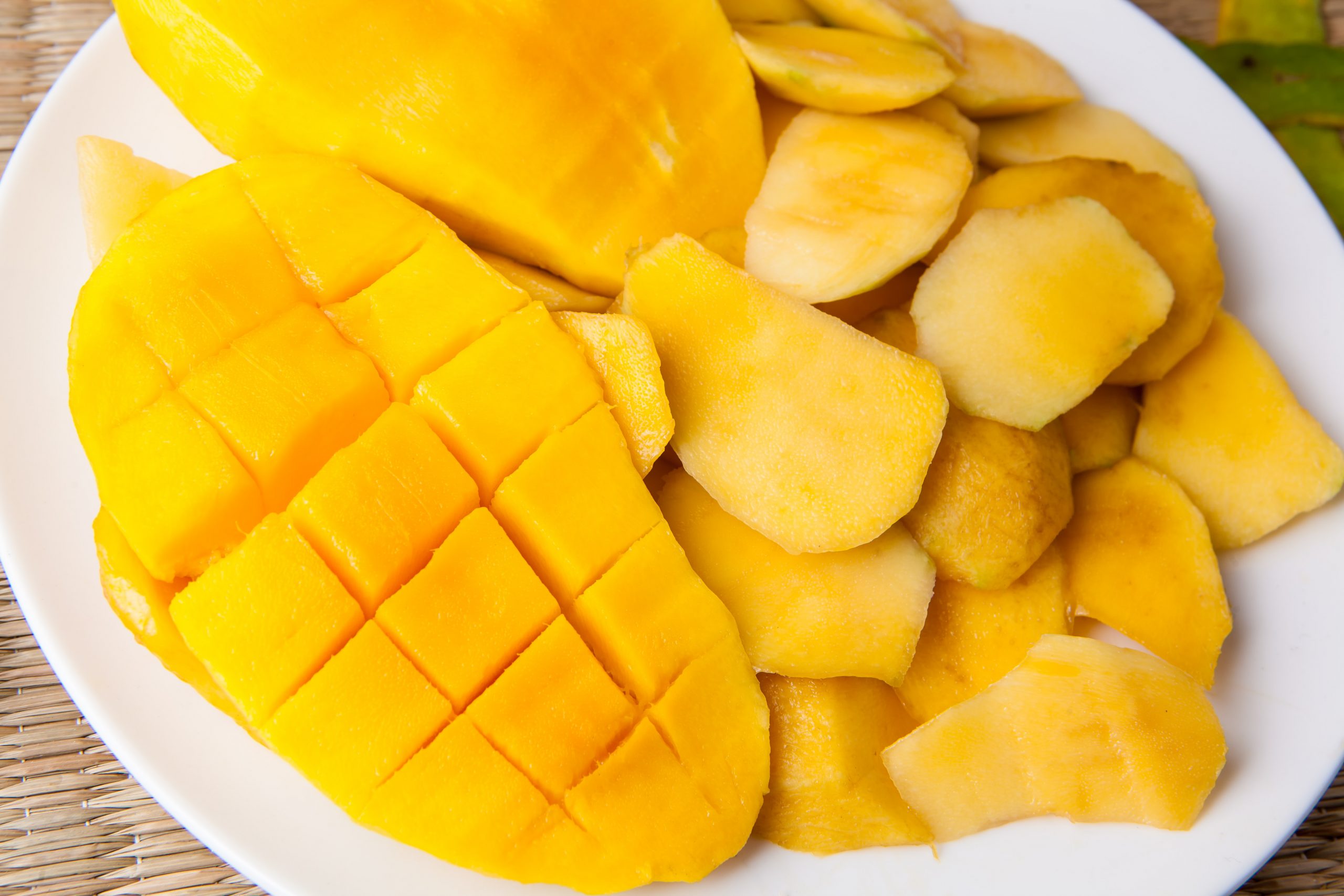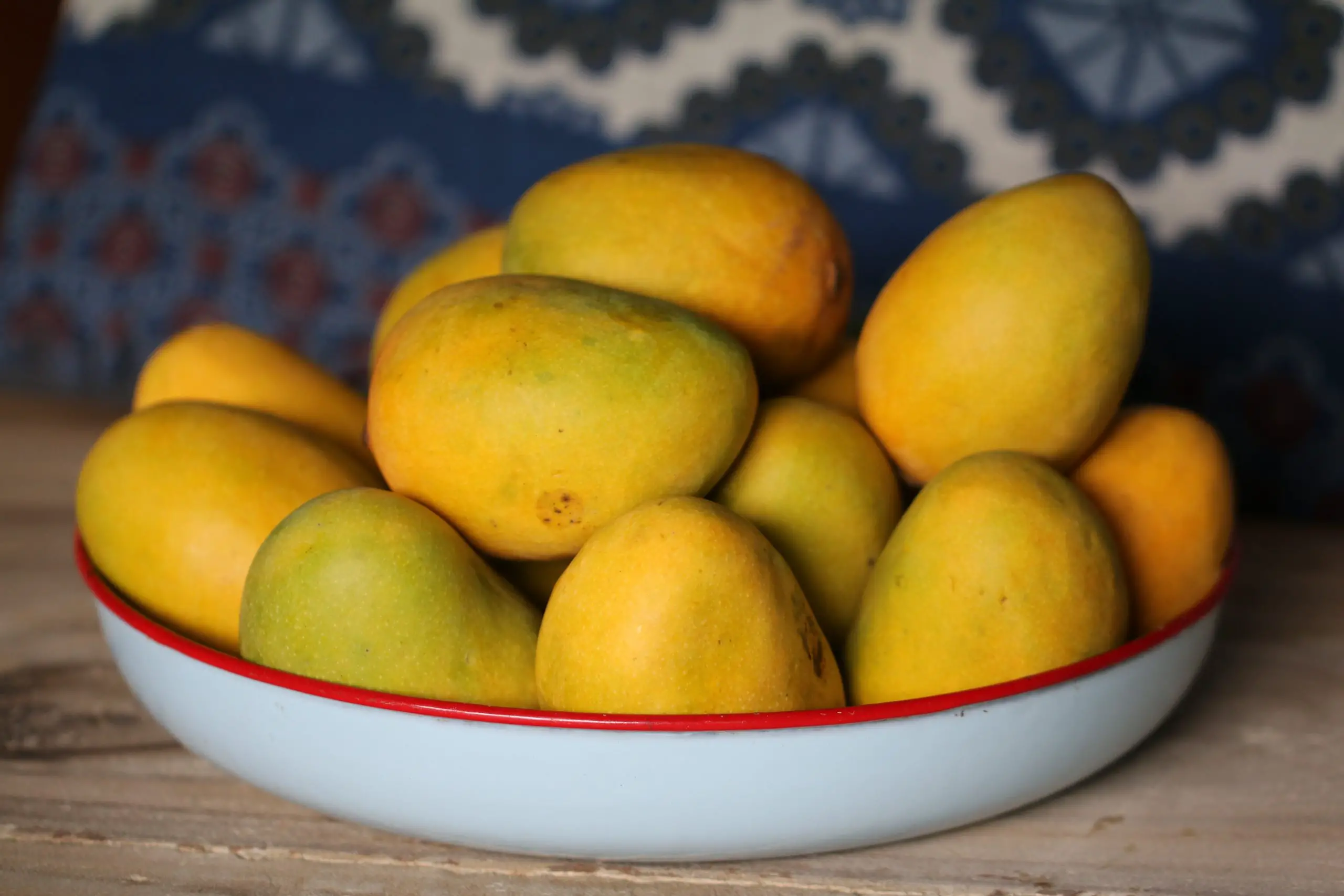Mangoes should be put in the refrigerator as soon as they are ready because doing so will delay ripening. Mangoes that are whole and ripe can be kept in the fridge for up to five days. Mangoes can be peeled, diced, and stored for several days in the refrigerator or up to six months in the freezer in an airtight container.

How to Store Mangoes?
Mango storage methods depend on the fruit’s ripeness, as you would have predicted. Mangoes that are still green should be kept at room temperature rather than in the fridge. The fruits will ripen at room temperature for a few days, becoming softer and sweeter. Mangoes should be stored in a paper bag at room temperature to hasten the ripening process. The mango is ready to eat once it gives slightly to the touch.
Eat your mango now if it is already ripe. Ripe mangoes are delightful, but they taste fantastic when chopped and baked into a cake, added to your morning smoothie, or sprinkled on top of porridge.
When is a Mango Ripe?
How the fruit feels in your hands should be your main concern. When lightly pressed, the flesh should yield somewhat but not significantly (mushy is overripe). It’s unripe if it’s still firm.
The next thing to consider is color. Depending on the kind, a mango transforms from green to orange or red as it ripens. It’s crucial to note that you shouldn’t hold off until the whole fruit has turned red or orange. A fully ripe mango typically has some green regions (see my mango above).
A fragrant scent is the last indication of ripeness that can be seen. My observations show that not all ripe mangoes smell pleasant. Typically, the ones I purchase don’t have any odor at all. Or maybe I have a terrible sense of smell.
As I said, you should concentrate on the feel. The mango is probably ripe and ready for you to eat if it feels somewhat mushy, but most of the skin is still green.
We may discuss where to put your fruit now that you know whether it is ripe.
How to Store Unipe Mangoes?
Keep unripe mangoes out of the sun and at room temperature (between 64 and 71 degrees Fahrenheit or 18 and 22 degrees Celsius).
Unripe mangoes shouldn’t be stored in the refrigerator; doing so will delay their maturation.
It all depends on the fruit as to how long it takes a mango to ripen. It should be ready to eat in five to seven days if it is uniformly green and solid. It should be ready in two to three days if the color begins to become red.
Give your mangos a cursory inspection daily, just like you would with other still-developing fruits.
How to Store Ripe Mangoes?
Ripe mangoes should be kept in the refrigerator. A whole mango should remain fresh for up to five days in the refrigerator. If you’re fortunate, you might have one or two more days.
The ripe fruit can, of course, be left on the counter or in a fruit basket.
That presents a problem because the mango will continue to mature swiftly and become overripe in a few days. It’s not a huge issue to leave food at room temperature overnight if you plan to eat it the following day.
How to Store Cut Mangoes?
There is no secret to it if you need to store some leftover mangoes. Place them in the refrigerator in an airtight container. For two to three days, the leftovers should maintain good quality.
I preserve the leftover mangoes in slices or cubes. This makes it simple to grab a piece here and there, and the container is always empty long before the fruit starts to deteriorate.
Try doing the same if you have trouble eating leftovers before they go bad.
How to Tell if Mango is Bad?
First of all, many mangoes have skin imperfections and scars. The one I photographed for this article definitely does, as you can see for yourself. Most of the time, the hue isn’t even. The fruit is just fine, and both are just fine.
Of course, things aren’t so ideal if the markings and blemishes go out of hand and begin to cover sizable portions of the skin. Peel that mango, but be prepared for discolored and perhaps rotten flesh.
Watch out for any mold and mushy flesh, as with any fruit. The former signals that the fruit is overripe and you should probably throw it away, whereas the former indicates that it has spoiled.
You can remove any tiny bruises or sunken areas of skin on the body (and some extra). Normally, there is no need to throw away the fruit if the remaining meat appears to be healthy. As with other fruits and vegetables, using common sense is essential.
Lastly, throw away your mango if anything about it seems odd. Maybe it tastes strange or has an odd fragrance. Or something doesn’t seem quite right, but you’re unable to identify what. In such a case, throw it away and purchase a new one.
How to Ripen Mangoes Faster?
The fruit mango produces ethylene, and it responds to the gas. The gas is trapped, exposing the fruit to more of it. Because of this, you can immediately hasten the ripening process by putting the fruit(s) in a sealed paper bag.
Add another fruit that produces ethylene, such as an apple, banana, or avocado.
Can you Store Mangoes in the Fridge?
Mangoes can be kept in the refrigerator. If you have a ripe mango that you aren’t quite ready to consume, put it in the refrigerator. In the refrigerator, whole, ripe mangoes will remain fresh for about five days. You now have more time to savor the fruit because the refrigerator’s chilly temperature will slow down the ripening process.
It would be best to give them some time to sweeten at room temperature. It is entirely up to you to refrigerate the mangoes with or without the peel. If they aren’t peeled, chop them up and put them in an airtight container before putting them in the fridge.
Can you Freeze Mangoes?
Mangoes can be frozen. They rank among the fruits that freeze particularly well. Slice or chop the peeled, ripe mango into cubes. Wait until the mango is fully ripe, then do the following actions to freeze it properly:
- Make sure that none of the mango pieces touch one another when you arrange them on a baking sheet covered with parchment paper.
- Put the baking sheet in the freezer for a minimum of two hours and a maximum of overnight.
- Squeeze as much air as possible from the freezer-safe bag before adding the frozen fruit pieces inside. Label the bag with the date and carefully close it.
Simply leave frozen mango in the fridge overnight to defrost it, or submerge the frozen mango pieces in a saucepan of cold water. Within three hours, the fruit ought to be completely defrosted. Mango will remain fresh when frozen in this way for up to six months.
How to Defrost Frozen Mangoes?
Mangoes can be frozen in various ways, and there are numerous methods for thawing them.
Place them overnight in the refrigerator. Mangoes or any other frozen food should be defrosted using this method. The length of time it takes to thaw is the only disadvantage.
Therefore, if you’re in a hurry, empty the container into a basin of cold water and let it sit there for three to four hours. The amount determines how long it takes to defrost.
However, you no longer need to defrost fruit if you plan to cook with it or blend it into a smoothie. Simply place it in a blender or a pot.
Simply allow the mangoes to defrost for a few extra minutes before cooking. Make smoothies using a smaller amount of ice than normal.
How do you Know if a Mango has Gone Bad?
No matter how much we work to extend a mango’s life, it will eventually die. Watch out for these three indications to determine whether your mangoes are still suitable for consumption:
If the skin has become black, is excessively mushy, and smells unpleasant… Now is the moment to discard them.
But wait, you can still use the mangoes if they are only overripe! Do not immediately discard them if the only damage you see is discoloration in some parts.
You may still use them to make smoothies, daiquiris, and mango popsicles, even though you can no longer consume them straight up or use them as a cake or dessert topping!
Conclusion
Mangoes are a fruit that will do much more than sate your hunger. Mangoes are a fantastic source of nourishment, whether ripe or not. (3) Mangoes are a rich source of vitamins, particularly vitamins A, B6, and C. You can get plenty of copper and folate from mangoes. Together, they aid in the production of red blood cells.
I’m confident that you won’t have to give keeping mangoes around for a while a lot of thought now that you know more about them and how to preserve them properly. Do you have any other practical advice for preserving mangoes?
